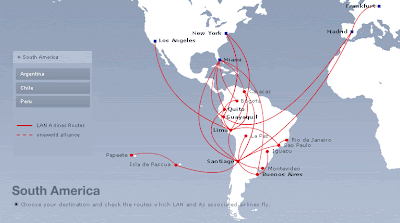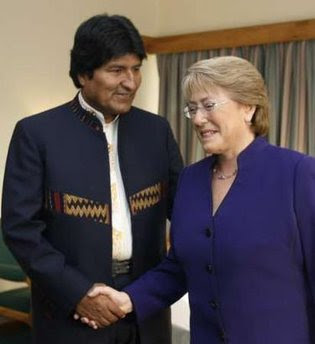
This week Argentina’s leftist president, Christina Kirchner, announced she would move forward with her plan to seize the nation’s private pension funds. Kirchner claims government seizure of the funds is needed to protect Argentinians from the global market crisis. But most observers believe her real motive is to use the $30 billion in seized assets to ease the massive debt obligations her leftist spendthrift government has run up. The move is unprecedented even by Argentina’s past socialist standards. Leftist icon Juan Peron called the nationalization of private pensions “theft” in a 1973 public address.
But desperate times call for desperate measures. And Kirchner has eagerly pointed to the unprecedented state interventions in the economy by the U.S. and Europe to help justify her policies. The proposed plan has already sunk Argentina’s markets and sent the Peso to new lows.
OCTOBER 28, 2008
=====================================
Argentina's Pension Plan Presses On, Driving Down Markets and the Peso

BUENOS AIRES -- Argentina's leftist government pressed forward with its controversial plan to nationalize private pension funds, laying out investment guidelines for the funds it wants to seize and lobbying Congress to approve the proposal.
Taking over the $30 billion in pension fund assets will ease the cash crunch faced by President Cristina Kirchner's government, but it has jolted investor confidence and triggered a dollar outflow.
The Argentine peso weakened to its lowest level in more than five years on Monday, slipping to 3.3 to the dollar from 3.28, despite central-bank intervention to support it. Traders estimate the central bank has spent roughly $500 million to $1 billion in interventions since Mrs. Kirchner announced the nationalization last Tuesday. The Buenos Aires stock market fell 5.7% on Monday, and bonds also fell.
Argentina has currency reserves of $46.3 billion.
Mrs. Kirchner said her move to seize the private funds is designed to protect contributors from alleged mismanagement amid the global market crisis. But economists say it is aimed at replenishing government coffers ahead of midterm elections and sizable debt payments coming due.
On Monday, Amado Boudou, head of the government-controlled pension system that operates in parallel to the private one, met with directors of the 10 private funds to outline the likely terms of their absorption into the state system. He indicated that rules to be issued on Tuesday will require repatriation of the funds' foreign holdings. Analysts interpreted the move as another effort by the government to support the peso.
A judge halted trading by the private funds on Oct. 21, alleging they were illegally unloading Argentine debt after having gotten advance word of the nationalization. The funds began trading again on Monday, but Mr. Boudou indicated the investigating judge will place monitors inside each fund to scrutinize their activity.
In advance of what is shaping up as a heated debate over the proposal in Congress, Mrs. Kirchner once again made her case for public pensions on Monday. "The public [sector] was considered a bad word ... and the state synonymous with inefficiency," she said. "The good of the private sector and the bad in the public sector were highlighted. We have to give the public sector its due."
=========
SOURCE:
Michael J. Casey ==>>michael.j.casey@dowjones.com
Matt Moffett ==>> matthew.moffett@wsj.com
Wall Street Journal Digital Network, http://online.wsj.com
..........................................................
October 28 2008 20:31
===============================================
Argentine pension funds told to repatriate cash
===============================================
Argentine pension funds were preparing on Tuesday to liquidate their assets in Brazil, to comply with a government order to repatriate funds that could enable it to support the peso, which this week fell to five-year lows against the dollar.
The move, a prelude to a proposed nationalisation of private pension funds, has intensified questions over what the government will do with the more than $10bn (€8bn, £6.4bn) the funds hold in private investments, including shares in domestic and foreign companies.
The government’s surprise announcement of a state takeover last week would transfer $26bn in assets to the state pensions system.
The funds will be given three days to sell their portfolios of shares in companies in Brazil and in other neighbours – valued at 1.8bn pesos ($540m, €430m, £345m) – and repatriate the cash. No date has been set, but it should begin in the next few days.
That cash influx will provide resources for the central bank, which has been using its $47bn reserves to stop the peso from sinking too fast. It hit 3.31 to the dollar on Monday, despite central bank intervention, and held steady on Tuesday.
President Cristina Fernández said the abolition of the 14-year-old private pension system was necessary to protect pensions at a time of global financial turmoil, and denied the government wanted to grab the funds to service debts, which officials say is some $21bn next year.
But surpluses from the state system, Anses, have recently provided a source of government funding. Its coffers were swollen last year by people returning to the state system.
Parliamentarians began discussing the nationalisation plan on Tuesday and the government is pushing for a vote as early as next week, though opposition parties want guarantees that the money will not be spent on Argentina’s debt. If the plan is passed, Anses will become the country’s biggest investor in capital markets, whose liquidity and depth will become greatly reduced.
Pension funds, or AFJPs, have 55 per cent of their assets invested in Argentine government debt, according to official data. But the value of that investment fell 8.2 per cent in the first half of October, reflecting sharp falls in bond prices because of the global financial turmoil and concerns about Argentina’s financing situation. Ten per cent of AFJP portfolios are in domestic stocks, which fell 15.5 per cent in the same period.
Their disappearance raises concerns about how the government will ensure a supply of credit to consumers, who have driven growth.
The government, which is keeping close tabs on the funds’ market operations, is subsequently expected to order AFJPs to sell other foreign assets.
========
SOURCE:
By Jude Webber and Stephen Fidler in Buenos Aires,
The Financial Times Limited, http://www.ft.com
==============================================
Throughout its history, the government of Argentina has often resorted to expropriating the property of its creditors and citizens. This month, in an ostensible move to protect the savings of workers in the face of a worldwide financial crisis, the administration of Cristina Fernández de Kirchner has proposed doing it again by nationalising private pension funds.
Taking over management of the pension assets of 9.5m people could, if the proposal makes it into law, ease the government’s debt repayment problems in coming years. It may also allow room for counter-cyclical measures to offset the global economic slowdown.


















